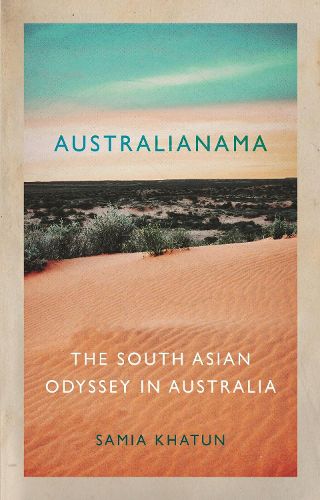Readings Newsletter
Become a Readings Member to make your shopping experience even easier.
Sign in or sign up for free!
You’re not far away from qualifying for FREE standard shipping within Australia
You’ve qualified for FREE standard shipping within Australia
The cart is loading…






Australian deserts remain dotted with the ruins of old mosques. Beginning with a Bengali poetry collection discovered in a nineteenth-century mosque in the town of Broken Hill, Samia Khatun weaves together the stories of various peoples colonised by the British Empire to chart a history of South Asian diaspora.
Australianama
(The Book of Australia) composes a history of Muslims in Australia through Sufi poetry, Urdu travel tales, Persian dream texts and Arabic concepts, as well as Wangkangurru song-poetry, Arabunna women’s stories and Kuyani histories, leading readers through the rich worlds of non-white peoples that are missing from historical records.
Khatun challenges a central idea that powerfully shapes history books across the Anglophone world: that European knowledge traditions are superior to the epistemologies of the colonised. Arguing that Aboriginal and South Asian language sources are keys to the vast, complex libraries that belie colonised geographies, Australianama shows that stories in colonised tongues can transform the very ground from which we view past, present and future.
$9.00 standard shipping within Australia
FREE standard shipping within Australia for orders over $100.00
Express & International shipping calculated at checkout
Australian deserts remain dotted with the ruins of old mosques. Beginning with a Bengali poetry collection discovered in a nineteenth-century mosque in the town of Broken Hill, Samia Khatun weaves together the stories of various peoples colonised by the British Empire to chart a history of South Asian diaspora.
Australianama
(The Book of Australia) composes a history of Muslims in Australia through Sufi poetry, Urdu travel tales, Persian dream texts and Arabic concepts, as well as Wangkangurru song-poetry, Arabunna women’s stories and Kuyani histories, leading readers through the rich worlds of non-white peoples that are missing from historical records.
Khatun challenges a central idea that powerfully shapes history books across the Anglophone world: that European knowledge traditions are superior to the epistemologies of the colonised. Arguing that Aboriginal and South Asian language sources are keys to the vast, complex libraries that belie colonised geographies, Australianama shows that stories in colonised tongues can transform the very ground from which we view past, present and future.